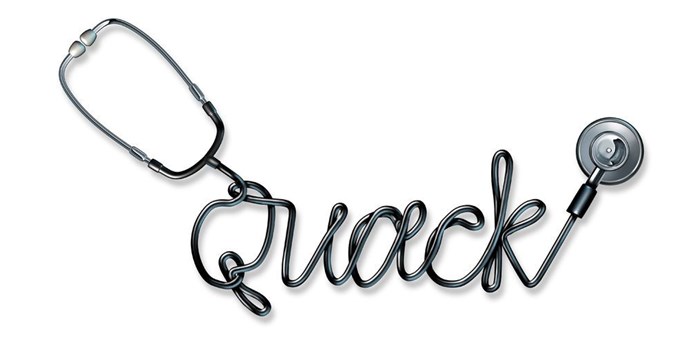
Top stories






More news















So, how did all this come about?
Well, back in February ’02, the MCC issued a call-up, aimed at assessing the contents and medicinal claims made by complementary medicines and whether they constitute a public health hazard.
“This was supposed to be a six-month audit of an estimated 6,000 products. This number jumped to 18,000, which jumped to 20,000. There are now over 150,000 on the market. The call-up was eventually rescinded in February 2017,” Roy Jobson, associate professor and specialist clinical pharmacologist, Sefako Makgatho Health Sciences, University of Tshwane, told the International Summit of Quackery and Pseudoscience.
He said that, as part of the call up process, manufacturers were issued a registry number by the Department of Health for products submitted. This was intended as acknowledgement of receipt, but was misinterpreted by the industry as meaning that the product had been registered with the department.
“A wording change by lawyers is not an adequate excuse for the chaos that ensued,” Jobson said.
“The MCC took no responsibility for the misleading advertising of unregistered medicine and substances. In fact the minister of health admitted to a written question in Parliament that none of the products had been tested for what they contained. So, it was left io the ASA to adjudicate on consumer-based complaints.”
The aim of the ASA, a self-governing industry body comprising advertising and media companies, is to ensure the ads seen by consumers are informative and honest. The trouble is that it has little legal authority, except over its members through a code of conduct.
Consumer complaints about ads would be investigated and rulings made, regardless of whether the advertiser was a member of the ASA or not. These were published on the ASA website and circulated to members if the ruling found that an advertiser was not complying with industry standards. Advertisers could appeal if the ruling went against them..
However, all this changed in 2016. Herbex, which markets weight loss products, took the ASA to court, challenging the body’s authority to issue rulings on complaints about products. The High Court agreed with Herbex, and made an order that declared the rulings against Herbex void, and also forced the ASA to remove the rulings from their website.
In addition, the ASA was interdicted from investigating any further complaints against Herbex. Effectively, the court's decision rendered the ASA toothless against any advertising by companies that were not ASA members, even where their adverts were published by ASA members.
In September this year, the Supreme Court of Appeal (SCA), restored some of the ASA’s power by removing the interdict against the ASA investigating Herbex, the order voiding previous rulings against Herbex and the order to remove all rulings against Herbex have been overturned.
However, the SCA recognised that the ASA’s decisions are not binding on non-members, although the order still allows the ASA to make rulings on any advert regardless of where it is published or who the advertiser is.
Consumer activist and editor of CAMcheck, Harris Steinman is an outspoken crusader against pseudo medicines. He's a regular (successful) caller at ASA's door, and he's been sued for millions by the likes of AntaGolin, Ultimate Sports Nutrition (USN) for taking them on.
Steinman said that the only avenue open to challenging complementary medicine claims is through the ASA. The body went into business rescue late last year, he said, as a result of legal costs incurred from the Herbex case, among others. "There's not a single regulatory body, except the ASA that is taking responsibility."
Another problem is that media houses often ignore ASA rulings. "The theory is beautiful, but the reality is dismal, especially when there are aggressive marketing budgets involved. Credible, newsworthy sources such as Carte Blanche are still showing these ads," Steinman explained.
And after a long, long wait, the Medicines and Related Substances Amendment Act, No 72 of 2008 finally came into force on 1 June 2017, which Jobson and Steinman hope will shift the responsibility on controlling complementary medicine claims back to the health authorities. But in the meantime, the ASA remains the go-to body to challenge quackery and pseudoscience.
